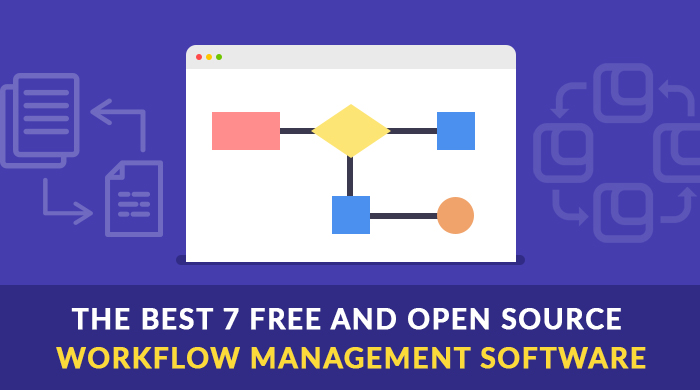“Successful workflow automation can eliminate unwanted or unpredictable failures”
The business landscape is rapidly changing, and challenges associated with remote working, communication, mismanagement, data errors, lack of accountability, extended deadlines, etc., are increasing. Owing to this, companies are implementing new technologies and tools for eliminating the hardships in work management. Workflow management is of great importance to businesses in avoiding such conditions. It is the process through which businesses manage, organize and document their workflows. By leveraging a tool like workflow management software, firms can automate their repetitive workflows, prevent data errors, miscommunication, deadline extension, etc.
Typically, businesses use work flow management systems to optimize and simplify their business processes. A well-developed business workflow management software can easily execute various organizational functions associated with collaboration, CRM, project management, business intelligence, product lifecycle management, business process management, product roadmap, project tracking, marketing automation, task management, human resource, accounting, scheduling, etc. In addition, workflow management offers numerous benefits such as minimizing errors, improved communication and collaboration, task automation, improved work completion, elimination of unwanted micromanagement, better access to information, etc.
What is Business Workflow Management?
Business workflow management is a critical business process where you systematically identify the tasks, organize them, coordinate them with the team, review them to see a specific outcome.
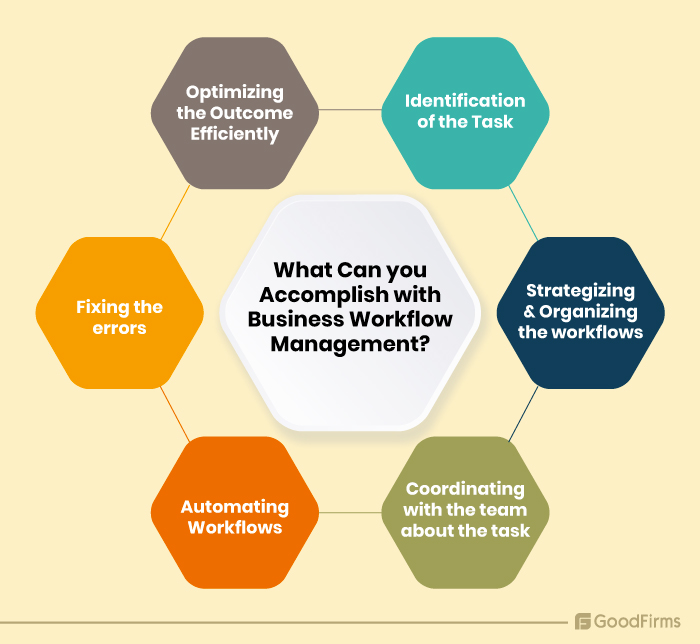
"The first rule of any technology used in a business is that automation applied to an efficient operation will magnify the efficiency." - Bill Gates, founder Microsoft, and Investor.
When should you invest in an automated workflow management software?
There is no perfect time to invest in automated workflow management tools. The present business landscape is rapidly changing and becoming more digital. In such a scenario, there is a dire need for businesses to opt for workflow automation.
Benefits of a Workflow Management System
A few reasons that supports the idea of investing in a AI-based workflow management software are as follows:
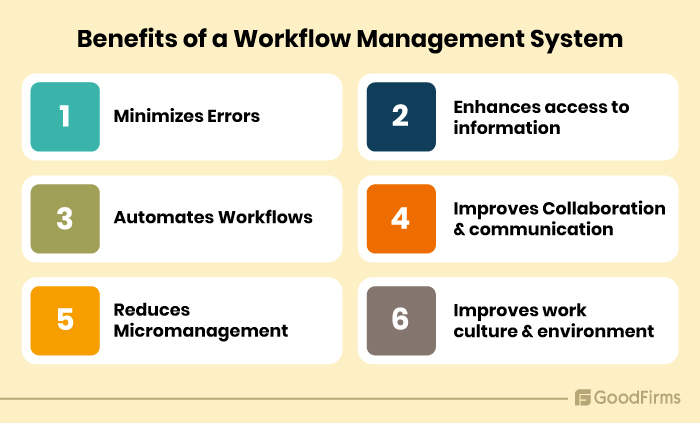
Minimizes Errors
Businesses are losing over $1 trillion due to lapses and errors in processes. An automated workflow software can save these costs as it operates through sets of pre-defined business rules. This reduces human interaction with business operations, thus, directly reducing the scope of human error. In addition, workflow management can also help notify about late actions and project deadlines to prevent process inefficiencies.
Enhances Access to Information
Typical project workflow management software comes with strong real-time reporting and data integration capabilities. This helps in generating better reports for tracking the project and task progress. In addition, these reports are easily available to the managers enhancing access to the information. Through this, management can acquire greater insights into the working of employees for making relevant decisions in less time.
Automates Workflows
According to a recent report by Salesforce, the demand for business automation is rapidly growing in the last two years as per 91% organizations. Automated workflow software offers easy tools to create, automate, and manage workflows. Users can automate several tasks that can be triggered based on certain conditions. Various tasks associated with customer service, marketing, and sales can be automated to automatically execute repetitive tasks, which helps in error prevention. This automation frees up employees for focusing more on strategic and value-based work.
Improves Collaboration and Communication
Workflow software provides several tools and functionalities to enable effective collaboration and communication among different teams and their members. Business workflow management software comes with 3rd party cloud integrations, role-based access control, instant file sharing, chat commenting, etc., through which team members can acquire greater real-time visibility into the workflows. The members can easily track, share, and manage different tasks of the project., allowing effective communication and coordination.
Reduces Micromanagement
Micromanagement is one of the top three reasons behind increasing employee resignations. Managers have to micromanage the different aspects of their team members at various points in their careers. With a workflow process software, managers can identify the areas where there is no need to micromanage the employees. This helps in reducing their workload. Furthermore, project workflow management software allows managers to aggregate data on teams and projects. Through this, they can properly take a look at the collected data enabling them to reduce micromanagement.
Improves Workplace Culture
With a proper workplace culture in place, businesses could achieve unreached milestones efficiently. WMS tools offer various features to lower the workload of employees through error-free processing, automation capabilities, improved coordination methods, etc., for the purpose of streamlining workflows. Through this, team members can easily track the task progress to quickly finish their part in the assigned work. This also reduces the conflicts among employees which helps maintain a good workplace culture.
Whenever businesses encounter work-related challenges or struggle with their workflow management, then they should invest in workflow management software to achieve improved results.
“Third generation workflow systems have generic, open workflow engines which provide an infrastructure for robust production-oriented workflow,” says, Asuman Dogac, author of Workflow Management Systems, and Interoperability.
How to Choose the Best Workflow Management Tool?
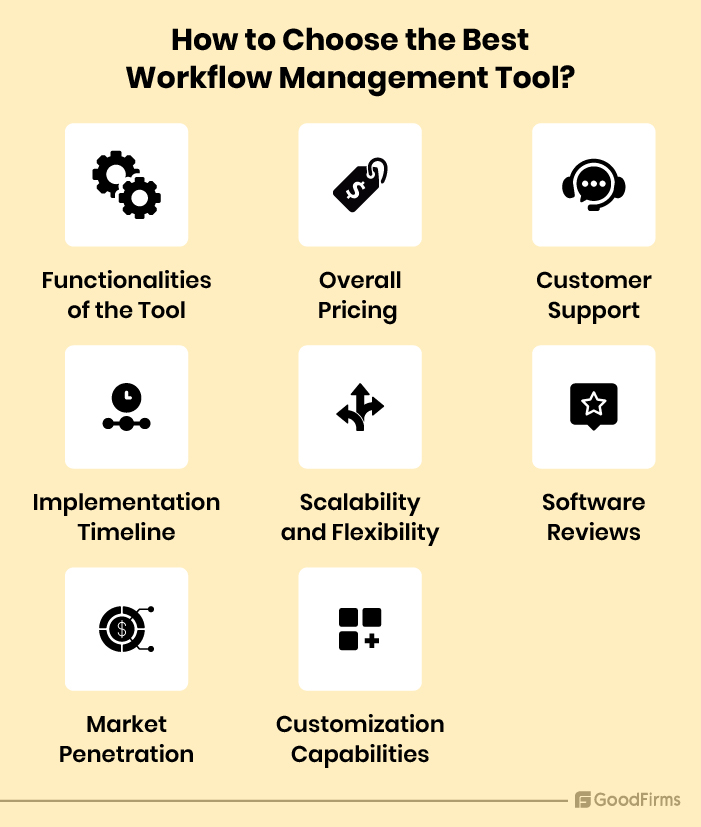
At present, the market is filled with a lot of workflow tools. Choosing a reliable and suitable tool from this pool is a complex task. There are certain factors that should be considered by businesses to choose the best workflow management tool with the required functionalities and capabilities. Buyers should focus on the following elements;
-
Functionalities of the Tool
-
Overall Pricing
-
Customer Support
-
Implementation Timeline
-
Scalability and Flexibility
-
Software Reviews
-
Market Penetration
-
Customization Capabilities
Based on these factors, businesses should evaluate at least 5-6 vendors and select an appropriate tool. If you lack the time and resources to evaluate the vendors, take help from top B2B review and rating firms like Goodfirms.
After evaluating the vendors, individually ask these questions to get a clear picture of the right tool.
15 Key Questions To Ask a Workflow Automation Software Vendor Before Purchasing
Q1. Does usage of your WMS require programming and other complex skills?
It is a major concern of businesses which should be cleared with vendors before investing in a new workflow system. This is because not all employees have programming and complex skills, due to which the usage is limited. If all employees cannot use the software as effectively as expected, then the investment loses its value. It also results in an increased budget as employees will need training to operate the software. A reliable WMS must be user-friendly and its basic features must be easy-to-use even by a non-IT person. Users should be able to easily navigate and perform their tasks without much assistance.
Ask for a demo from the vendors themselves. If they cannot easily operate their own tool, chances are low for your employees too.
Q2. What are the key features offered by your workflow software? Are the functionalities common or industry-specific?
Every user desires maximum RoI from their workflow tools, and functionalities play a crucial role in attaining the maximum possible RoI. A good workflow management software enables access control/permission management, process automation, reporting and analytics, process modeling, document management, compliance tracking, etc. Inquiring the vendor about the available features is a good idea. Further, questions associated with extended/add-on features can also be raised with the vendor.
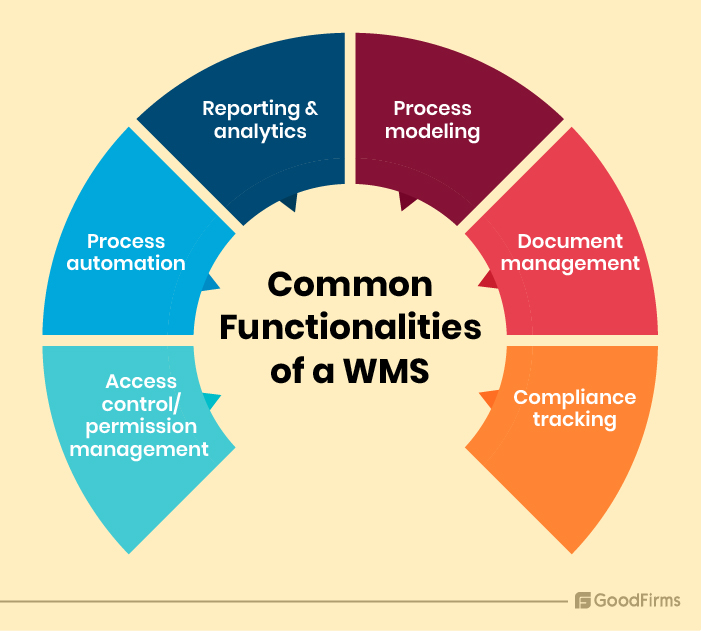
One more key point to confirm with the vendor is whether the features are common or industry-specific. Small businesses and general product-based start-ups can go for common functionalities. However, industry-specific features are good for big firms in accomplishing their vision with the highest performance and quality standards. Around 80% of the respondents of a research analysis stated that automation allows them to perform their job role better. Therefore, with proper automation features, businesses can ensure their employees are working properly, enabling better performance and productivity.
Q3. What is so unique about your software? Why should I choose your workflow automation software?
This is a commonly asked question through which the USP of a vendor can be identified. The majority of the functions are common in almost all workflow management software. Therefore, users should ask the vendors about the services and functions which distinguish them from the competitors. One should also inquire about the changes the tool can bring to the business in terms of team collaboration, decision-making, efficiency, productivity, etc.
Unique WMS offers unique automation qualities through which businesses can improve their operational efficiency. In a latest survey, 96% of the respondents mentioned process automation as a critical factor in achieving the digital transformation goals of the company. Check for additional factors that generally distinguish businesses from each other such as the level of customer support, active users, infrastructure costs, etc.
Q4. How much time will it take to implement your workflow management system?
This is a very important question to ask from the vendor. Shorter time means quick implementation and utilization, which maximizes productivity. Whereas long implementation time means the shift from older to newer tools will be slow, leading to barriers in working of employees, which may result in low business performance. Small tools generally take a few weeks to complete implementation, and the time may vary in terms of user configurations and training.
Large and customized WMS are more complicated to install and may take months to complete the implementation. This is because they are customized to work with the existing infrastructure of the business. In addition, the workforce also needs to familiarize themselves with the new tool for using it efficiently, which is, again, a time-consuming task.
It is the responsibility of the buyer to get clarification from the vendor regarding the implementation timeline. Share your estimated time frame and ask theirs for getting a clear idea of the overall time consumed in the software installation.
Q5. What are the deployment options available for your workflow management tool?
Deployment option also falls under major considerations as it greatly influences the software budget, security, and performance. WMS are mainly deployed as an on-premise system, cloud, and hybrid infrastructure. On-premises deployment is suitable for organizations with more IT budget as the server is hosted within the organization. Maybe it is expensive, but it offers strong data security and integrity.
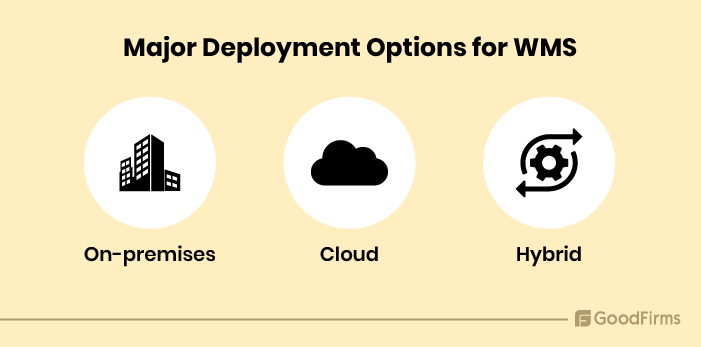
Cloud deployment is also a good option for organizations who don’t want to invest in physical infrastructure. 86.7% of business owners plan to deploy their workloads on cloud-native platforms anytime soon," as per Goodfirms' research. Cloud deployment offers public and private cloud servers for software hosting. In hybrid deployments, some components and services are hosted on cloud servers of vendors and some components are installed within the organization itself. The deployment model directly influences the overall costs and performance of the tool. Therefore, choose your deployment model wisely based on business requirements, budget, and required level of security clearance.
Q6. What’s included in the pricing? Are there any hidden costs involved?
It is very vital for the users to properly understand the pricing structure before selecting a vendor. Personal research is of great importance and should be done before selecting software based on its price shown in promotions. Take a note of the hidden costs. These include, installation charges, hardware costs, maintenance fees, hosting costs, training charges, etc. Make a note of such charges and confirm with the vendor if there are any hidden costs involved. Are these recurring charges, or is it a one-time investment? Does the vendor offer per user pricing model or per processor model?
Carefully read their pricing and refund policies. All these considerations are beneficial in determining the approximate cost of the software.
Q7. What is the scope of scalability in your workflow management software?
Growing businesses should select workflow process software with high scalability. Higher scalability means enhanced capabilities of database restructuring, end-user customizations, and continued connectivity to business processes. High scalability will allow existing software to fulfill the growing business requirements, which eliminates the need to invest in new tools. This is beneficial in ensuring that the software can adapt to the dynamic business landscape and growth. This also helps in reducing IT costs while achieving better RoI and a successful software experience. So, check with the vendor about the updates, the process of updating the software (whether it is done remotely, does it incur extra charges, will there be any notification, guidelines, support etc.).
Q8. Can your workflow management software Integrate well with our existing systems without altering our tech stack?
Integration capabilities are very crucial for business tools like workflow management software. Around 39% businesses stated that they feel their software is somewhat integrated with their current tech stack instead of integrating it completely. This means these software often fail in data acquisition from various other tools. However, the data transfer and acquisition process becomes very easy with proper integration through workflow integration software. Large firms can choose a tool with more integration features as they have bigger teams and numerous departments, tools, and frameworks to connect with.
Small businesses often use few tools and have low manpower, due to which they can opt for a WMS with limited and essential integrations only to ensure data security with minimum investment. It is the responsibility of the businesses to check how the tool would fit into the existing tech stack. If there are any barriers to implementation, ask the vendor. Check for your organizational tools and confirm with the vendor whether the WMS supports these integrations or not. A WMS that supports integrations with all organizational tools helps in data centralization by bringing data from different tools to a single place.
Q9. Which type of support can we expect for assistance and challenges?
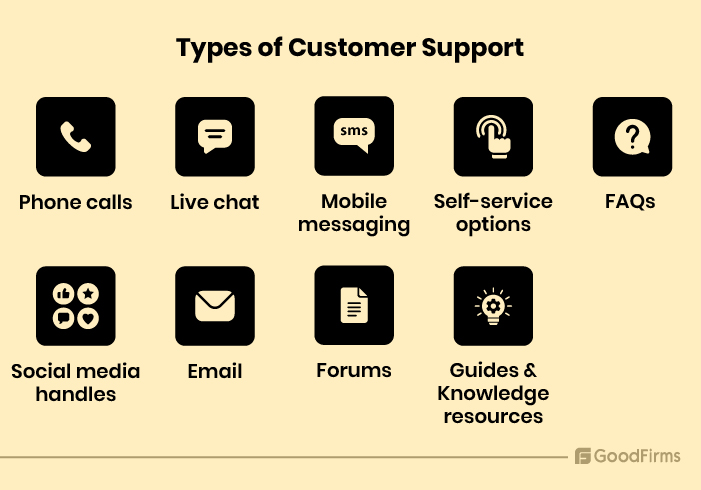
Customer support is a critical consideration when using software for business operations. Numerous challenges are experienced by businesses both pre and post-installation, for which users desire quick assistance. Vendors offer their assistance through many channels, such as phone calls, live chat, mobile messaging, self-service options, FAQs, social media handles, email, forums, etc. Check with the vendor about the available support channel that can be used for quickly and timely assistance. Also, inquire about the level of support in terms of implementation, process mapping, workflow building sets, pilot testing, etc.
Q10. How secure is the workflow management software? Can it safeguard our data against cyber threats?
In these digital times, nearly 7 out of 10 firms in the US are vulnerable to cyber attacks owing to which data security and protection are among the biggest business concerns. Workflow management software offers integration with various third-party extensions and tools. This could further increase the risk of cyber threats, which should be considered by the vendors and the users during software purchases.
One should inquire about the past data breaches experienced by the clients of the vendors. Which type of security measures are in place to safeguard against threats? What happens whenever someone tries to access data illegally? Does the vendor comply with SOC2 (System and Organization Controls) requirements? Research and ask some more important security-related questions from the vendors before investing. Security is one of the top five consideration factors when investing in software as per 42% of businesses, when surveyed. So, only consider a vendor if the software offers the highest data security and integrity.
Q11. What about customization?
Software customizations are becoming a critical component when purchasing a new software for business needs. With robust customization functionalities, the software can be modified as per the changing business requirements, which adds to more RoI. A business has several departments, and with customization, the software can be configured department-wise, which is beneficial in enhanced business productivity.
Check with the vendor about the customization level needed with regard to your business. Moreover, make a note of your organizational add-ons and ensure the software can be customized accordingly.
Q12. What are the latest trends and technologies included in your workflow software?
In today’s technological landscape, the rise of new technologies is very frequent. Evolving technologies such as artificial intelligence, machine learning, big data, AR/VR, IoT, Blockchain, etc., are leveraged by many WMS to implement new features in business processes.
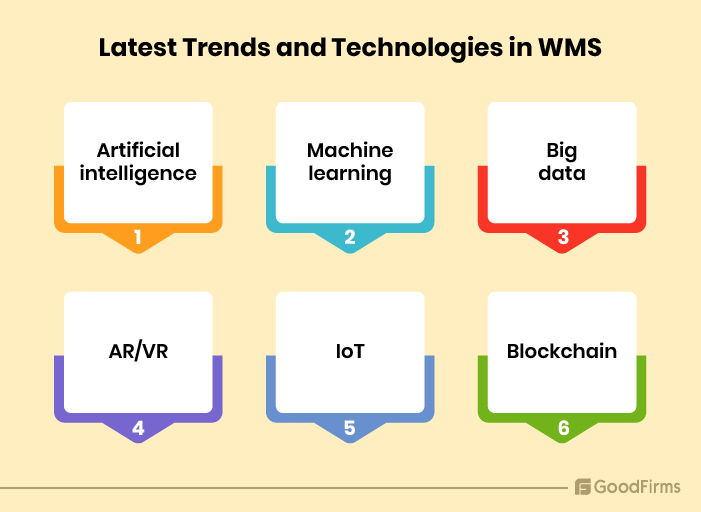
The buyer should do sufficient research to determine the ways these technologies are used in the WMS and clarify with the vendor. If these technologies are not present, the buyer should clarify with the vendor if they can be integrated into the workflow integration software using customizations or other methods?
Q13. Can your workflow management software solve our business process automation requirements?
According to a Goodfirms research on automation, around 46.3% respondents have already implemented automation to handle their business processes, whereas 40.3% are planning to implement automation soon.
Workflow management software comes with strong automation abilities that can help avoid issues while ensuring high performance and efficiency. In addition, WMS can also fulfill other requirements associated with sales, HR, marketing, customer service, order processing, etc. Evaluate your automation requirements and, based on that, choose your software vendor.
Q14. What challenges can we address with your workflow software?
In day-to-day activities, businesses often experience multiple workflow-related challenges. Data errors, miscommunication, unstructured processes, compliance concerns, etc., are some common workflow-related challenges. Infact, nearly 70% of the surveyed firms invest in a software with a forward-looking approach. Workflow software offers numerous benefits, such as quick and reliable data access, instant communication across teams, process structuring, etc., which are useful in reducing workflow challenges.
Buyers should acquire a deep understanding of such business challenges and check which the vendors.
Q15. Can you share some of the successful implementations of your workflow management software?
Every vendor will display their past projects in the portfolio. When going through the portfolios, take a clear look at the type of projects worked, clients, their industry, company size, implementation time, results acquired through implementation, etc. In addition, businesses should also go through the client testimonials and reviews offered by the vendor for a more concise idea about the successful implementations.
What Does the Future Hold for Workflow Management Software?
Automation and artificial intelligence are the two critical technologies that are defining success of any business today. Those who adapt these technologies are sure to lead the race.
Businesses, whether small or big, are preparing to adopt AI-based work flow management systems to improve their business performance. With a CAGR of 25%, the workflow management tools market is anticipated to grow upto $130 billion, showing immense growth potential in the coming years. The global uncertainties such as COVID-19 also fueled the digital-first approach which has created room for automation. A reliable workflow automation and management software can be the right investment at this point. Before the need arises, it makes sense to ask the above mentioned questions with a vendor and make a wiser choice. To create a workflow model, you need to start the process by brainstorming. The questions mentioned above can be the best way to start.





